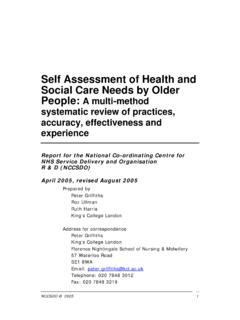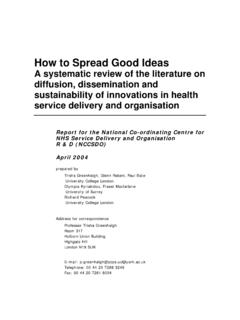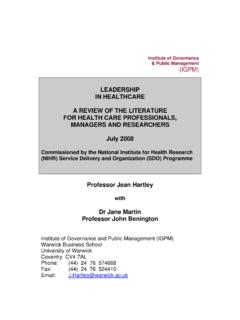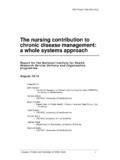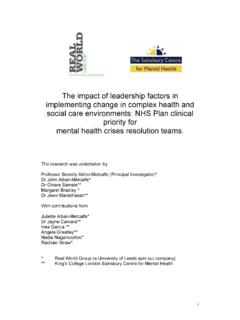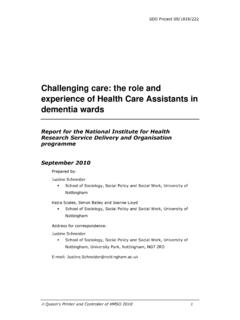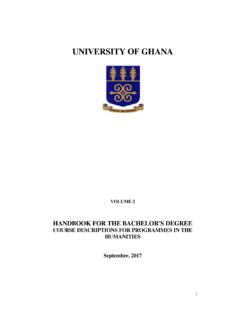Transcription of Concordance, adherence and compliance in medicine taking
1 concordance , adherence and compliance in medicine taking concordance , adherence and compliance in medicine taking Report for the National Co-ordinating Centre for NHS Service Delivery and Organisation R & D (NCCSDO). December 2005. The report authors and core project team were: Rob Horne Centre for Health Care Research University of Brighton John Weinman Institute of Psychiatry, King's College London Nick Barber School of Pharmacy, University of London Rachel Elliott School of Pharmacy and Pharmaceutical Sciences, University of Manchester Myfanwy Morgan Department of Public Health Sciences, King's College London Contributing co-authors: Professor Alan Cribb, Professor of Bioethics and Education, King's College London (Chapter 5). Dr Ian Kellar, Research Fellow, Centre for Health Care Research, University of Brighton (Chapter 6 and related Appendices).
2 Address for correspondence: Professor Rob Horne Centre for Health Care Research University of Brighton, Falmer, Brighton BN1 9PH. E-mail: Telephone: 01273 643985 Fax: 01273 643986. NCCSDO 1. concordance , adherence and compliance in medicine taking Contents CONTRIBUTORS 7. EXECUTIVE SUMMARY. Main findings and take home messages 10. Why this scoping exercise is necessary 11. A conceptual map and research agenda 11. Terminology compliance , adherence and concordance 12. Terminology recommendations 13. Determinants of medication- taking behaviour 13. Theme 1: explaining medication- taking behaviour 13. Theme 2: patient-provider interactions and communication in healthcare 15. Theme 3: societal policies and practice 15. Doing the right thing: the normative theme 16. Theme 4: interventions to facilitate adherence 16.
3 Research priorities 17. Conclusions and recommendation 20. THE REPORT. SECTION 1 INTRODUCTION 24. Why we need this scoping exercise 24. Aims of the scoping exercise 25. Method 26. Conceptual map 26. Gathering and evaluating the evidence 27. Summary of deliverables 31. Use of the term patient' 31. References 32. NCCSDO 2. concordance , adherence and compliance in medicine taking SECTION 2 CONCEPTS AND TERMINOLOGY 33. compliance , adherence and concordance 33. One label for two agendas 34. Terminology recommendations 36. Caution over the use of the term concordance 36. adherence as the term to describe patients' behaviour 36. Informed choice and supported adherence 37. When does nonadherence matter? 40. Can nonadherence be good for patients? 42. Identifying and measuring nonadherence 42.
4 Types of nonadherence to medication 42. adherence assessment tools 43. Conclusions regarding measurement of adherence 44. The need for honest disclosure of nonadherence 44. References 45. SECTION 3 EXPLAINING PATIENTS' BEHAVIOUR 47. Introduction 47. Overview of explanatory factors 48. Regimen complexity 48. Information and patient knowledge 49. Memory and recall 50. Prescription costs 51. Social support and adherence 51. Depression and anxiety 52. Patients' beliefs 52. Imposed compliance 60. adherence in vulnerable groups 60. Children and adolescents 60. Older people 62. Ethnic minorities 62. A model for guiding interventions 63. Outstanding research questions, 65. Patients' perceptions of medicines 65. NCCSDO 3. concordance , adherence and compliance in medicine taking Modelling intentional and unintentional nonadherence 66.
5 Methodological developments 67. adherence and clinical outcome 67. Change over time 67. adherence in vulnerable groups 67. References 67. SECTION 4 PATIENT PROVIDER INTERACTION AND. HEALTH CARE COMMUNICATION 76. Introduction 76. The empirical evidence: what we know 76. Studies of hcp-patient interaction 76. Studies of other communication methods 80. Communicating with different groups 80. The role of prescribers' beliefs 81. Research agenda 81. Effects of the consultation on adherence 82. Practitioner perceptions and behaviours 82. Shared decision-making 82. New prescribers 82. Facilitating communication of adherence 83. References 83. SECTION 5 SOCIETAL POLICY AND PRACTICE 87. What is the impact' of non- adherence ? 87. Measuring societal impact of nonadherence 88. Evidence for the societal impact of nonadherence 89.
6 Patient-based estimates of economic impact 91. Impact of societal policies on adherence 93. Measuring policies' impact on adherence 102. Study design in policy analysis 102. Conclusion 103. Priority research questions 103. References 105. NCCSDO 4. concordance , adherence and compliance in medicine taking SECTION 6 UNPICKING THE PHILOSOPHICAL AND. ETHICAL ISSUES IN MEDICINES PRESCRIBING AND. taking 111. Terms, concepts and models 111. Different concepts, different uses 112. compliance , adherence or concordance why do they matter? 115. Ethical issues - patient autonomy, paternalism and the public good 117. Research questions and research priorities 118. Good prescribing 119. Good medicine taking 120. Emerging research priorities 121. References 122. SECTION 7 INTERVENTIONS TO FACILITATE adherence .
7 124. Introduction 124. Evidence from systematic reviews- what works and why 124. Roter review 124. Peterson review 125. Haynes review 126. Summary and synthesis across the reviews 130. Limitations of adherence interventions research 130. Conclusion 134. Should we give up on adherence interventions? 135. Research priorities 136. Lessons for the content of interventions 137. Applying the MRC framework for complex interventions to adherence 140. References 144. NCCSDO 5. concordance , adherence and compliance in medicine taking SECTION 8 RESEARCH PRIORITIES AND CONCLUSIONS. 146. Getting the best from medicines: an agenda for behaviour change 146. Research priorities: an empirical and normative agenda 147. The empirical agenda: developing effective interventions to facilitate informed adherence 148.
8 Specific research questions to inform the design of interventions 149. Theme 1: explaining patient behaviour 149. Theme 2: patient-provider interactions and healthcare communication 151. Theme 3: societal policy and practice 152. Theme 4: interventions to facilitate adherence 153. Developing technologies for behaviour change 155. The systematic development and evaluation of interventions 156. The normative agenda 156. Overarching issues: adherence in vulnerable groups 157. Mapping research questions onto the sdo research priorities 158. Conclusions 160. APPENDICES. NCCSDO 6. concordance , adherence and compliance in medicine taking Contributors Project team These were the original applicants and were responsible for the delivery of the project to the National Coordinating Centre for Service Delivery and Organisation (NCCRCD): Professor Rob Horne, Professor of Psychology in Health Care, Centre for Health Care Research (CHCR), University of Brighton.
9 Professor John Weinman, Professor of Psychology Applied to medicine , Institute of Psychiatry, King's College London. Professor Nick Barber, Professor of the Practice of Pharmacy, School of Pharmacy, London University. Dr Rachel Elliott, Clinical Senior Lecturer, School of Pharmacy and Pharmaceutical Sciences, University of Manchester. Dr Myfanwy Morgan, Reader in Sociology of Health, Department of Public Health Sciences, King's College London. This report was prepared by the project team and the following: Professor Alan Cribb, Professor of Bioethics and Education, Centre for Public Policy Research, Department of Education and Professional Studies, King's College London. Dr Ian Kellar, Research Fellow, Centre for Health Care Research, University of Brighton. Ms Keri Peters, Research Assistant, Centre for Health Care Research, University of Brighton.
10 Ms Rhian Parham, Research Assistant, Centre for Health Care Research, University of Brighton. Dr Jane Clatworthy, Research Fellow, Centre for Health Care Research, University of Brighton. External contributors Expert Panel Mr Stephen Firn, Chief Executive, Oxleas NHS Trust and Registered Mental Nurse. Professor Justin Keen, Professor of Health Politics and Information Management, Nuffield Institute for Health, University of Leeds. Dr Richard Meakin, General Practitioner and Senior Lecturer in Primary Care, Medical Humanities Unit, Department of Primary Care and Population Sciences, Royal Free and University College Medical School. NCCSDO 7. concordance , adherence and compliance in medicine taking Professor Alan Cribb, Professor of Bioethics and Education, Centre for Public Policy Research, Department of Education and Professional Studies, King's College London.
